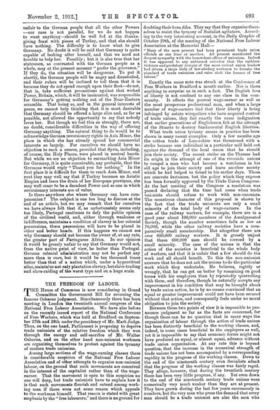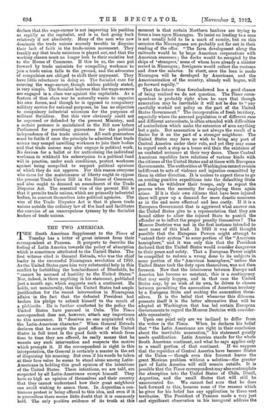THE FREEDOM OF LABOUR.
THE House- of Commons is now considering in Grand Committee the Government Bill for reversing the famous Osborne judgment. Simultaneously there has been meeting in London the twentieth annual congress of the National Free Labour Association. We have also before us the recently issued report of the National Conference of Free Workers, which was held at Bradford on Septem- ber 27th and 28th under the presidency of Mr. Mark Judge. Thus, on the one hand, Parliament is proposing to deprive trade unionists of the relative freedom which they won through the energy and self-sacrifice of Mr. Walter Osborne, and on the other hand non-unionist workmen are organizing themselves to protest against the tyranny of modern trade unionism.
Among large sections of the wage-earning classes there is considerable suspicion of the National Free Labour Association and of other attempts to organize non-unionist labour, on the ground that such movements are conceived in the interest of the capitalist rather than of the wage- earner. That the movement is open to this suspicion no one will deny, but trade unionists have to explain how it is that such movements flourish and extend among work- ing men if there were not some reason which appeals to the workman himself. That reason is stated with great emphasis by the " free labourers," and there is no ground for doubting their bona fides. They say that they organize them- selves to resist the tyranny of Socialist agitators. Accord- ing to the very interesting account, in the Daily Graphic of October 29th, of the meeting of the National Free Labour Association at the Memorial Hall- " Many of the men present had been prominent trade union officials at one time or another. All present manifested the deepest sympathy with the benevolent offices of unionism. Indeed it was apparent to any unbiassed onlooker that the ruthless violence and predatory designs of the more violent union leaders had driven a large body of law-abiding workmen to forsake the standard of trade unionism and raise aloft the banner of free labour."
Exactly the same note was struck at the Conference of Free Workers in Bradford a month earlier. Nor is there anything to surprise us in such a fact. The English love of liberty is not confined to any one class in the com- munity. It affects the poorest wage-earner as well as the most prosperous professional man, and when a large number of wage-earners find that their liberty is being infringed by astute wirepullers who have acquired control of trade unions, they feel exactly the same indignation that earlier generations of Englishmen felt at the attempt of the Stuarts to destroy fundamental English liberties.
What trade union tyranny means in practice has been shown in many recent examples. Only a few months ago the cotton trade of Lancashire was threatened with a strike because one individual in a particular mill hold out against the demand of the local union that he should join their society. The recent strike on the Thames had its origin in the attempt of one of the riverside unions to compel a man who had become a watchman in his old age to join their society and leave another society which he had helped to found in his earlier days. These are concrete instances, but the policy which they express has been formally approved by the Trade Union Congress. At the last meeting of the Congress a resolution was passed declaring that the time had come when trade unionists should refuse to work with non-unionists. The monstrous character of this proposal is shown by the fact that the trade unionists are only a small minority of the total body of wage-earners. In the case of the railway workers, for example, there are in a good year about 100,000 members of the Amalgamated Society, though the number sometimes falls as low as 70,000, while the other railway societies have a com- paratively small membership. But altogether there are over 600,000 railway workers. It is grossly unjust that those 600,000 men should be coerced by a small minority. The case of the unions is that the action of the societies is beneficial to the whole body of workers, and that it is unfair that a few should do the work and all should benefit. To this the non-unionist answers that he does not ask the unions to do the particular work which they undertake. He believes, rightly or wrongly, that he can get on better by remaining on good terms with his employers than by repeatedly quarrelling with them, and therefore, though he naturally accepts any improvement in his condition that may be brought about by trade union action, he is by no means convinced that an equal or greater improvement could not have been secured without that action, and consequently feels under no moral obligation to join the society. Between these two points of view it is impossible to pro- nounce judgment so far as the facts are concerned, for though there can be no question that in many ways the organization of labour through the action of trade unions has been distinctly beneficial to the working classes, and, indeed, in some cases beneficial to the employers as well, yet it is impossible to say that economic forces might not have produced an equal, or almost equal, advance without trade union organization. At any rate this is beyond question, that the increase in the numerical strength of trade unions has not been accompanied by a corresponding rapidity in the progress of the working classes. Down to the end of the nineteenth century even Socialists admit that the progress of the working classes was fairly rapid. They allege, however, that during the twentieth century there has been very little progress, if any. Yet even down to the end of the nineteenth century trade unions were numerically very much weaker than they are at present. They have grown during the last few years enormously in numbers, but the very men who press the demand that every man should be a trade unionist are also the men who declare that the wage-earner is not improving his position as rapidly as the capitalist, and is in fact going back relatively if not absolutely. Many of the men who now dominate the trade unions scarcely trouble to disguise their lack of faith in the trade-union movement. They frankly say that trade unionism is played out, and that the working classes must no longer look to their societies but to the House of Commons. If this be so, the case put forward by trade unionists for compelling workmen to join a trade union falls to the ground, and the advocates of compulsion are obliged to shift their argument. They have little reluctance in doing so. The Socialist case for coercing the wage-earner, though seldom publicly stated, is very simple. The Socialist believes that the wage-earners are engaged in a class war against the capitalists. As a feature of that class war he naturally wants to organize his own forces, and though he is opposed to compulsory military service for national purposes, he has no objection to compulsory industrial unionism for the purposes of militant Socialism. But this view obviously could not be espoused or defended by the present Ministry, and a certain pretence is maintained in the Bill now before Parliament for providing guarantees for the political independence of the trade unionist. All such guarantees must be futile if once the principle be admitted that trade unions may compel unwilling workmen to join their bodies and that trade unions may also engage in political work. No devices for a ballot or for authorizing the individual workman to withhold his subscription to a political fund will in practice, under such conditions, protect workmen against being compelled to support political opinions of which they do not approve. For this reason everyone who cares for the maintenance of liberty ought to oppose the present Trade Union Bill in the House of Commons, and also ought to demand an amendment of the Trade Disputes Act. The essential vice of the present Bill is that it permits -trade unions, which are primarily industrial bodies, to convert themselves into political agencies. The vice of the Trade Disputes Act is that it places trade unions outside the ordinary law of the land and facilitates the exercise of an unscrupulous tyranny by the Socialist leaders of trade unions.



























































 Previous page
Previous page